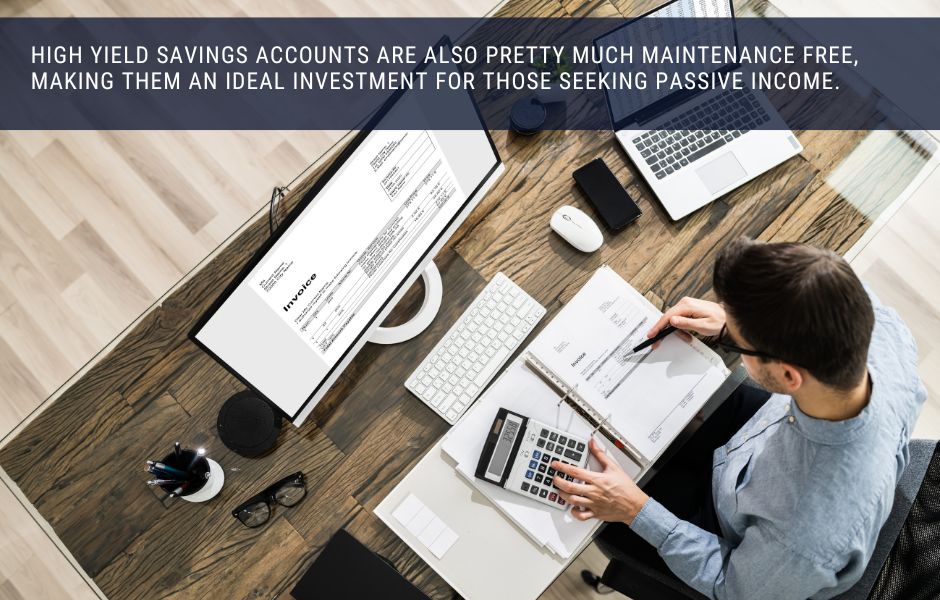Passive Income Investments | High Yield Savings Accounts
High yield savings accounts are one of the lowest risk options to add more passive income to your investment portfolio. Usually associated with low yields, now interest rates are on the rise investors are reconsidering…

David Garner
Passive Income Investments | High Yield Savings Accounts
High yield savings accounts are becoming increasingly popular with investors hoping to earn a better passive income return on their investments. This is especially true now we are in an economic cycle defined largely by rising interest rates.
In this article, we’ll take a look at exactly what high yield savings accounts are, why investors use them, some of the top providers, how to open one, and what type of terms they offer right now in 2023.
Pro Tip: Get Details of Brand New Passive Income Investments Delivered to Your Inbox Every Thursday
What is a High Yield Savings Account?
A high yield savings account is a type of savings and investment account offered by financial institutions such as banks and credit unions.
These types of account usually pay a better interest rate than standard savings accounts, but yields vary from one account to another based on the financial organization that offers the account.
Why Investors Use High Yield Savings Accounts?
There are several reasons investors choose to use high yield savings accounts as part of a diversified portfolio of investments.
First and foremost, the higher rate of interest allows investors to earn more money on their savings. This can be especially beneficial for those who are saving for a specific goal, such as a down payment on a home or a child’s college education. The higher interest rate can help them reach their savings goal more quickly.
High yield savings accounts are also pretty much maintenance free, making them an ideal investment for those seeking passive income. Passive income can be periodically reinvested to generate wealth through compound interest, or to draw down annually to cover living costs.

Another reason investors choose these types of accounts is the fact that they are very easy to open. Most financial institutions offer online account management, which allows investors to easily track their account balance and transactions.
Finally, a huge reason high yield savings accounts are so attractive is because your deposit is insured by the federal government. So, if the financial institution you hold your money at were to fail, your cash would be protected up to $250,000 per depositor per institution.
This government-backed protection gives investors peace of mind, and mitigates almost all of the risks associated with investing.
How to Open a High Yield Savings Account?
Opening a high yield savings account is a simple, straightforward process…
Nowadays, most financial institutions allow you to open an account online in just a few minutes. All you need to provide is some basic personal information, such as your name, address, and social security number.

In addition, you will typically also need to make an initial deposit to fund the account. The amount of this initial deposit varies depending on the provider, but it is typically much lower than the minimum deposit requirement for other types of investment accounts.
What Kind of Terms Do High Yield Savings Accounts Offer?
Depending on the financial institution supplying the account, the investment terms given by providers of high return savings accounts differ from one account to another. Nonetheless, these kinds of stories frequently have a few distinctive characteristics.
Interest Rate: The main characteristic that distinguishes a high yield savings account from a conventional savings account is the interest rate it offers. Depending on the financial institution, the interest rate may vary, although it is typically greater than the rate provided on a conventional savings account.
Minimum Deposit: Most financial institutions need a minimum deposit from investors in order to fund the account. The needed minimum deposit may differ based on the banking institution however the minimum deposit is often smaller.
Minimum Balance: In addition to a minimum deposit amount, some high yield savings account providers require investors to maintain a minimum balance in their accounts in order to avoid fees, or maintain the higher interest rate.
Term: There is often no fixed term or maturity date to a high yield savings account. This means they are a flexible investment choice for individuals who need a better return on their money without committing to a longer period of illiquidity.
Benefits and Advantages of High Yield Savings Accounts
There are several benefits to using a high yield savings account as part of a diversified portfolio fo investments…
Higher Interest Rates: Of course, the higher rate of interest to a high yield savings account is one of the main benefits. Better returns equal more growth, better capital preservation, and lower risk.
Easy to Open and Maintain: High yield savings accounts are very easy to open, and require almost zero ongoing maintenance. Most providers also offer account management online, which means you can easily track your account balance and transactions from almost anywhere at any time.
Passive Income: Due to the fact that these types of accounts are so easy to maintain, the income is almost entirely passive. That makes these accounts great for investors that need regular income to cover living costs, and well as those who are looking to build wealth over the long-term by reinvesting the income for compound growth.
Monthly Income: Some high yield savings accounts pay monthly income. This makes them even more suited to investors who are looking to draw down income to cover monthly expenses.
Federal Insurance: High yield savings accounts are federally insured under the FDIC. This means that if the financial institution were to fail, your deposits are protected up to $250,000. This provides investors with peace of mind and helps to mitigate almost off of the risk associated with investing.
No Lock-In Period: High yield savings accounts are typically offered on an ongoing basis, with no set term or maturity date. This makes them a flexible investment option for investors who want to earn a higher return on their savings without committing to a longer-term investment.
Easy Access to Funds: Unlike other types of investment accounts, high yield savings accounts typically offer easy access to funds. This means that you can withdraw your cash at any time without incurring penalties. This is especially useful if you need to access cash to cover unforeseen emergency expenses such as medical bills.
Best High Yield Savings Accounts in 2023
If you are looking around for the best rate from your high yields savings account, there are plenty of options to consider.
Here is a list of the best high-yield savings accounts as of February 2023, based on analysis and research from CNBC Select and Bankrate:
1.Western State Bank: Currently offering an annual rate of 4.40% p.a., with a minimum balance requirement of $5,000.
2.Third Federal Savings and Loans: Currently paying investors 4.30% p.a., with a minimum balance requirement of $5,000.
3. Bask Bank: The high yield savings account from this bank pays p.a., with no minimum balance requirement.
4.Lending Club: This newer alternative lender offers investors an annual rate of 4.00% p.a., with no minimum balance requirement.
5.Marcus by Goldman Sachs: Marcus is offering savers a high yield savings account paying an annual rate of 3.75% p.a., with no minimum balance requirement.
Conclusion
High yield savings accounts can be an excellent alternative for investors wishing to earn a larger return on their funds.
These accounts provide various benefits and advantages over ordinary savings accounts due to their higher interest rates, convenience of access, and government insurance.

Investors may often start a high return savings account online through a straightforward process that includes personal information and an initial investment.
If you want to expand your money, consider opening a high return savings account at a financial organization that matches your needs.
References
Investopedia – What is a High Yield Savings Account
Bankrate – Best High Yield Savings Accounts in February 2023
FDIC – High Yield Checking Accounts FAQ
Experian – Do You Get Taxed on Your Savings Account?
CNBC – Best High Yield Savings Accounts February 2023


